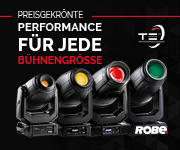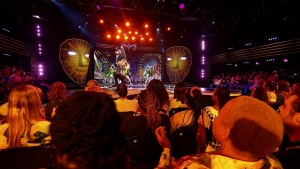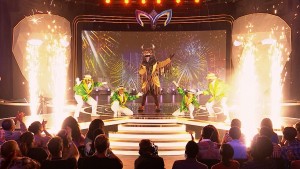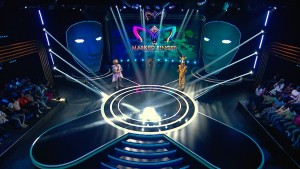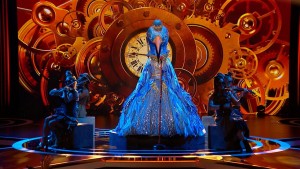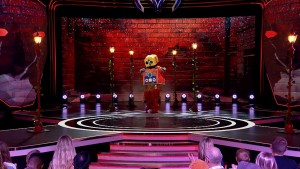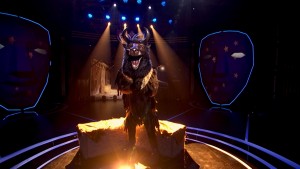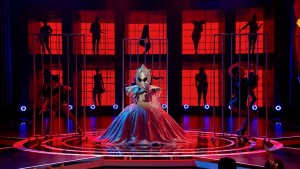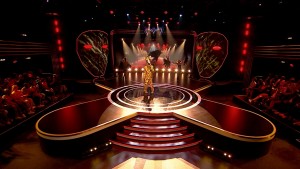Aktuelle News & Schlagzeilen
Hippotizer unmasks visuals for “The Masked Singer South Africa”
Hit TV series “The Masked Singer” kicked off its second season in South Africa in April 2024 with sixteen celebrities battling it out in flamboyant costumes to hide their identities. The production team ramped up the staging, lighting, and visuals for the 2024 contest using TVOne’s Green Hippo brand of Hippotizer Boreal+ MK2 Media Servers alongside a GrandMA3 console to create projections and LED screen animations.
On stage, a 11 m x 4 m 2.9 pixel pitch Absen LED main wall backed each performer, displaying custom-made content designed in collaboration with “The Masked Singer South Africa” Creative Director Barry Pretorius and Set Designer Michael Gill. In addition, there were two 2 m x 4 m LED walls for Unreal Engine 3D effects rigged behind two stage left and right mask-shaped surfaces, which were projection mapped using the Boreal+ MK2 via four Christie projectors. Behind the judges’ table the team also rigged an 8 m x 2 m LED wall.
Blond Productions supplied all technical equipment for the show, including sound, lighting, LED walls and playback for the clue package (VTs designed to hint at each performers’ identity) and studio phases respectively, operators and the Unreal Engine. The team also used their own Hippotizer Boreal+ MK2 Media Server, which was purchased from DWR Distribution.
“The Boreal+ MK2 was perfect for this production”, says Ryan Lombard, Head of Department Show Lighting at Blond Productions and Co-Owner of Blond Digital, who co-designed and operated the show. “It has 4 x 4K outputs and ours was fitted with a dual capture card to receive SDI and DVI. The SDI input was used for the broadcast feed and the second was used to run Unreal Engine on the LED walls behind the masks. We ended up using seven outputs and two inputs from one device.”
For the production, the team needed to manage various feeds and graphic elements, including the show graphics, live feed and visuals from the Unreal Engine. All content was created by Digital Union, with each song graphic crafted based on direction given by Pretorius.
“In the clue package phase, we played back graphics from Digital Union”, explains Lombard. “In the studio elements we had graphics made for the general look and feel for the holding state and logos and elements specifically made for each song. Songs included graphics for the main LED wall and the masks being projection mapped, fed from the Boreal+ MK2. Each mask had two projectors allocated and aligned to them. The clue packages were sent from a Tricaster and fed to the Boreal+ MK2. These were playbacks of the clue packages we had previously shot, or sometimes clips that came in last minute that needed to be fed in. We also fed Unreal Engine into the system to create a set extension behind the masks, and this world was created and managed through us.”
The team used many of the built-in effects from Hippotizer, most of which were used to create some flare and interest at the end of show sections. “There were so many moving parts in this production and having a single media server solution driving all these different elements with ease and being able to control it from a lighting device simplified the process immensely”, says Lombard. “On the main set we used the Hippotizer’s ability to scale outputs for pixel perfect fits to the LED walls, bypassing the need for LED wall scalers. Some layers had to be alpha keyed as the show heavily relies on layers to build perfect looks. We also used the masking tool to mask out the projectors on the masks to minimise light bleed on the set, and masks were also heavily used on VS show graphics to blend certain graphics together.”
“The Masked Singer South Africa” is produced by multimedia company Rose and Oaks, under licence from Primedia and format owner Fremantle, and broadcast on SABC channel S3.
(Photos: TVOne/Rose and Oaks/SABC)
SCHLAGZEILEN
news archiv
suche
© 1999 - 2025 Entertainment Technology Press Limited News Stories





